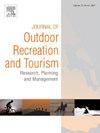Tangible or intangible satisfiers? Comparative study of visitor satisfaction in a nature-based tourism destination in the pre- and during-COVID pandemic
Abstract
Nature-based destinations started to become objects of travel for various visitor segments during the COVID-19 pandemic. The changing environment and the travel conditions influence overall visitor satisfaction and its determinants. This study identifies the role of tangible and intangible factors in forming overall visitor satisfaction with a stay in a nature-based tourism destination and their changes due to the COVID-19 pandemic. A Generalized Linear Model with a logit link function was used to identify the significant satisfiers and to determine the factors that play a critical role in visitor satisfaction in the during-COVID era compared to the pre-COVID period. The results show that intangible satisfiers play a more significant role than tangible ones in the COVID time. Surprisingly, natural features are insignificant in explaining overall satisfaction at a nature-based destination in the during-COVID in comparison with the pre-COVID period. In contrast, active sports options have become a significant satisfier in the COVID era. This comparison results contribute to the current theory, and the findings indicate the practical implications for Destination Management Organisations regarding sustainable tourism development.
Management implications
- •
Destination Management Organisations (DMO) in nature-based destinations should become more conscious of changing visitor structures concerning destination satisfaction.
- •
DMOs could focus more on promoting activities such as active sports options and tourism infrastructure than natural features regarding current visitor preferences; however, sustainability should be a fundamental goal of competitive tourism destinations.
- •
There is a need to carefully deal with the expanding tourism infrastructure development and prevent uncontrolled growth of commercial activities and attractions that would act against the interests of residents and endanger the value of the natural environment.
- •
DMOs should educate the changing visitors about the importance of responsible tourism.
- •
DMOs should focus on environmental-friendly activities which do not negatively impact nature in terms of using land and natural areas for commercial activities and construction.
- •
DMOs should make efforts to attract their environmental sensitive pre-COVID visitors and target new segments searching for health and sustainability, such as the Lifestyle of Health and Sustainability (LOHAS) segment and the Free Independent Travellers (FIT).

 求助内容:
求助内容: 应助结果提醒方式:
应助结果提醒方式:


